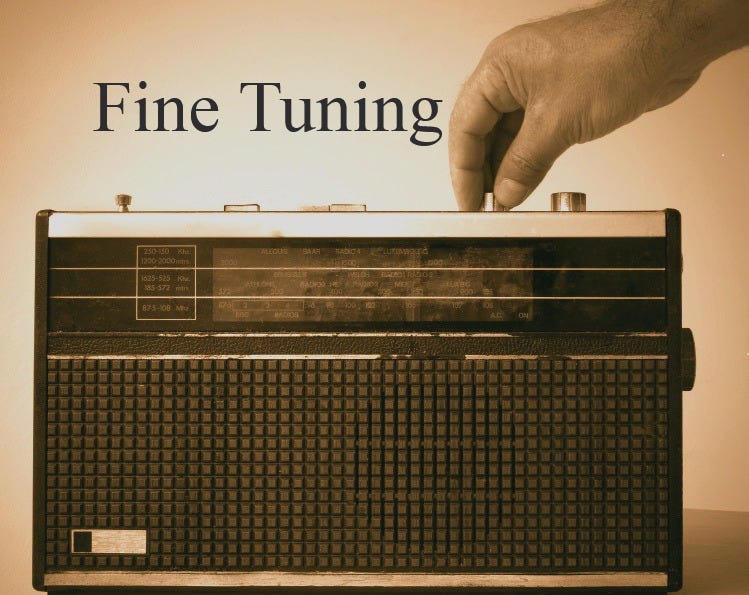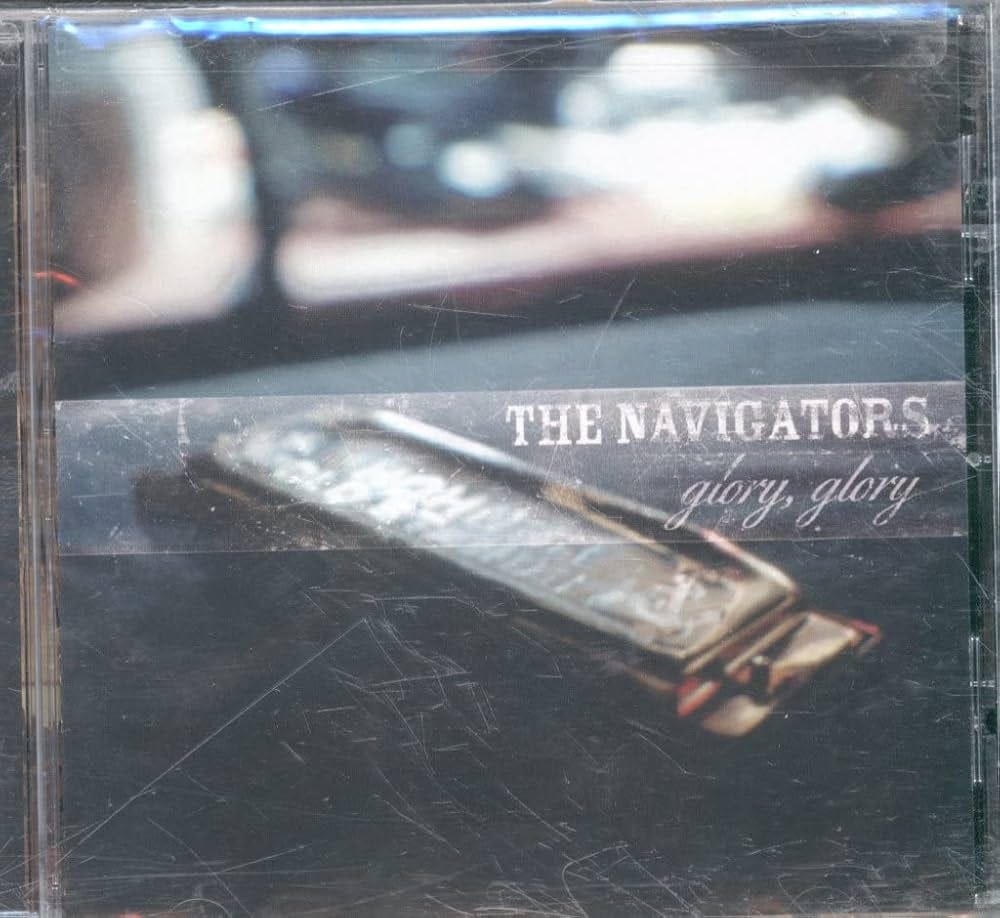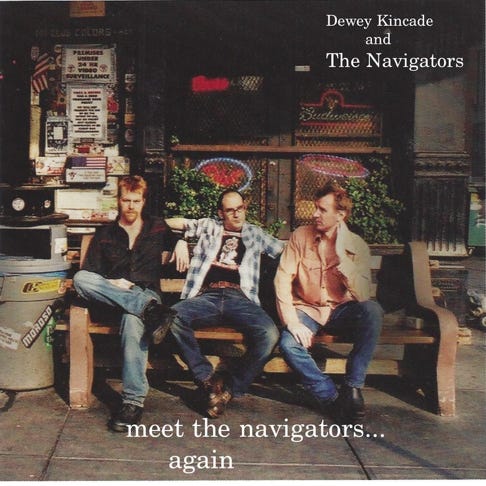In 2004, a band called The Navigators released an EP called Glory, Glory. It was haunting, gorgeous, and utterly penetrating. For me, “One Line Epitaph,” “I See You Clearly,” and “The River,” constitute the greatest opening one-two-three punch of any musical recording in rock history. Okay, maybe excluding the first three tracks of Sticky Fingers. And perhaps Who’s Next. And Def Leppard’s High ‘N’ Dry, of course. Maybe.
That 6-track Glory, Glory CD, which I still possess in physical form, continues in heavy rotation, burned onto an external drive that I access through my Sonos system.
And yet, after Glory, Glory, I never heard of The Navigators again. They seem, inexplicably, to have fallen off the face of the earth.
I’m not sure why it took me over twenty years, but I recently embarked on a journey to suss out what ever became of that exquisite band.
It was not a straightforward project.
An initial Spotify search for “The Navigators” turned up a hodgepodge of bands with that moniker, including a Celtic outfit whose song, “The Islander,” appears on a 2007 compilation called Newfoundland Drinking Songs, Volume 2. And I’d certainly commend that song to anyone gearing up for a bender. Particularly those who hail from Newfoundland and like a touch of jingoism with their ale:
I’m a Newfoundlander born and bred and I’ll be one till I die
I’m proud to be an islander and here's the reason why
I’m free as the wind and the waves that wash the sand
There’s no place I’d rather be than here in Newfoundland.
(If interested, you can find more of these guys’ work on the 2003 compilation Homebrew, Volume 4.)
As much as I like a raucous Celtic drinking song, this group was most definitely not “The Navigators” I was searching for.
I next typed “Navigators Glory Glory” into the Spotify search window and huzzah! there appeared the EP cover and track listing. I’d found them! But hold on… only the first track, “One Line Epitaph,” had a live link and it was to the soundtrack for the movie, Dreamriders. The other five tracks were greyed out.
Undaunted, I clicked on the greyed-out link for “The River.” Which landed me right back on that Celtic band’s Spotify page. As did the “Go To Artist” link. WTF?
Perplexed, but resolute, I retreated to my basement to comb through my CD collection in search of Glory, Glory, hoping the jewel case’s insert might contain some clues. I found the CD in one of the dusty and warped plastic storage bins that used to house my collection of over 300 CDs (I’ve since upgraded to a 5-foot CD tower). Sure enough, just above the copyright date was a website that I excitedly typed into my phone’s browser. Which landed me on a page associated with “Atlantic Canada’s most unique electric/acoustic Celtic band”—a group with whom, of ocurse, I was already well acquainted.
In a last ditch effort to solve this puzzle, I scoured the CD’s credits and learned that all of the songs on Glory Glory were written by Dewey Kincade, the lead vocalist and guitar, piano, and harmonica player. A quick online search for Dewey Kincade brought me to a live page maintained by the original Navigator himself—I’d cracked the code!
Turns out, Dewey Kincade, who hails from Louisville and considers Bob Dylan his greatest musical influence, has been making music in some form or another all the while, albeit intermittently and in various artistic configurations.
But before getting to all of that, let’s listen to some of The Navigators’ music. As noted, the only track off Glory, Glory that’s readily available is the EP’s opening track, “One Line Epitaph.” Although my preference would be for you to start with “I See You Clearly,” “One Line Epitaph” is a stellar stand-in. I’d highly recommend grabbing some high quality headphones so you can make out the interweaving fury of the dueling harmonicas half-way through the track that resolve into soaring, concluding harmonies. I’ve never heard two harmonicas simultaneously tearing through a piece of music like that. It’s just glorious. And it may help explain why a beat up harmonica adorns the EP’s cover. Take a listen.
Not bad, eh? And the lyrics are as powerful as those dueling harmonicas:
Life is simpler when you know just who you are
‘Til the breakdown comes and you find that you were wrong
That oppression comes for an extended stay
Stand on the shore and watch your future drift away
I think we’ve all stood on that shore at some point.
Although you’ll search in vain online to find any version of Glory, Glory’s single, “I See You Clearly,” Dewey re-recorded the tune for his 2024 solo release The Heights. It sounds very little like the original rocker, having been stripped down considerably, but it still shares its shuffling groove. “For this version, I went back to the way I originally played it,” Dewey explains. “It all begins with the plucked guitar part. Little by little, a new instrument comes in so that when you get to the bridge, you have a full soundscape.” Check it out.
And, of course, the impassioned lyrics remain. Dewey writes on his blog that “Bridges are tricky, and I’m of the mindset that you skip it if you don’t have a good one.” He’s got a great one here:
We can’t seem to know that life is a bow
And we are all arrows born to fly
We push so hard just to move backwards
Until we turn around and sail through the sky
Love that imagery.
Sadly, I can’t offer you even a note of “The River,” re-recorded or otherwise. It’s really too bad. It’s a wrenching song of a girl whose mother dies of cancer, leaving her to raise the family as “dad took it pretty bad, he became a drinking man, disappeared long before he died,” the mother’s last words to her daughter forming the song’s mournful chorus:
She said, “hold me tight, ain’t gonna live forever
Ease my mind, try to sweep it clean
All these years living by the river
And I don’t know where it leads”
A piercing, hollow harmonica, sounding like something off Springsteen’s Nebraska, comprises the solo, complementing, and elevating, the lyrics’ emotional punch. Take my word for it. Or better yet, just download Glory, Glory from iTunes, or score the CD from eBay (you still have a CD player, right?). That’s the standup thing to do anyway. It’ll be the best $5.89 you’ve ever spent.
Now that you’re familiar with Glory, Glory, let’s dig a little deeper into The Navigators’ catalogue. The band’s first release was 1998’s Who Are The Navigators, a prescient title given the numerous incarnations the band would go through over the next twenty-five years. Dewey himself seems unsure of the answer. “It’s a good question,” Dewey writes of the query on his website and then takes six sprawling paragraphs to offer an answer.
Who Are The Navigators is an excellent introduction to Dewey’s introspective, sometimes maudlin, songwriting; take as an example, “Learn to Suffer”:
You got to learn to suffer in this world
You got to learn to eat the pain
You fight it all you can, but in the end you understand
It’s better if you don’t resist the rain
There’s also some mischievous playfulness that gestures towards Dylan. “She said get a grip, but I don’t know what to hold,” Dewey retorts in “Christ, I’ve Done It Again.”
After Who Are The Navigators came out, Dewey got cancer. As he then describes on his website (writing in the third person):
By the time he recovered from cancer, he had no band and no career… . He then moved to New York City, and started playing with a new version of The Navigators. This band released Meet the Navigators and Glory, Glory and began touring up the East Coast. They were signed to Velour records and began performing from Maine all the way to California. Unfortunately, within a year Dewey was the only original member left touring, and the label did not have the money to record another album.
That’s when the trail went cold for me.
Apparently, at this point Dewey began recording with a new lineup of The Navigators and in his telling, “this sounded like the band that would put Dewey over the top, but before anyone could hear the results, the band was dropped from Velour, the booking agent pulled out, and Dewey had no career. Again.”
This lineup did produce a record called Love and War, Vol. 1 under the name Dewey Kincade & the Navigators. There’s a brief acid jam instrumental called “Foam Born” that’s worth checking out. Very different from Dewey’s other stuff. The balance of the record isn’t bad, but it’s not Glory, Glory.
According to Spotify, Love and War, Vol. 1 was released in 2008. Then nothing for over a decade, until 2019 when Dewey released an album aptly called Meet The Navigators … Again. Shame on me for failing to keep up with the twists and turns of Dewey’s musical career—that 2019 record is excellent, start to finish.
The record starts strong with “Hold On,” a short rumination on a failed relationship—familiar turf for Dewey, to be sure. But I love the electric guitar riff that forms the song’s structure and the way Dewey overlays sharp stabs of acoustic guitar half-way through the song to build depth. Check it out.
Next up is “Sooner or Later.” As Dewey recounts,
I started writing this song when I was fifteen. By that point in my life, I was deeply enmeshed in Bob Dylan. I wanted to write like Dylan, but I was fifteen and had little hope of achieving that. But Dylan did have some deceptively simple songs. His song, “Rainy Day Women #12 and 35” … seemed like the kind of song that I could write even as a fifteen-year-old. I tried. I came up with a pretty good chorus: sooner or later everyone’s gonna hurt you in the end. I mean, a fifteen-year-old can write that, and anyone can relate to it. But my verses were weak.
It took Dewey another fourteen years and living through a brutal breakup to fill out the verses. “They are the words of a devastated man,” he says of those verses. “So yeah, fifteen years to write a song. You need a fifteen-year-old to come up with a chorus so simple that a room full of strangers can sing it when they first listen to it, but you need someone with some real-life experience to put that chorus in context.”
In addition to some new tracks, Meet The Navigators … Again features a few old songs with new arrangements, including “One Line Epitaph,” which has been stripped of all harmonica as well as the soaring vocals at the end. I much prefer the original—in my view those dueling harmonicas make the song. Listening to this mellower version, I was reminded of how I felt back in 1984 when Def Leppard for some reason released a new version of its 1981 classic, “Bringin’ on the Heartbreak” from the aforementioned High ‘N’ Dry, this one inexplicably loaded down with soul-leaching synthesizer. Huh? If it ain’t broke, don’t fix it, am I right?
But let’s get past that. It’s still a strong record.
In 2023, some iteration of The Navigators released Standing on a Rock. The standout track is the closer, “Roll Baby Roll,” an absolutely filthy blues-rock banger that on first listen put me in mind of the Stones’ alternate take of “Loving Cup” from the Exile on Main Street re-issue. (which is not to say, mind you, that it’s in the same league as that classic—don’t get too excited!). Both start in stripped down fashion until the rest of the band kicks in with a bent electric guitar note leading the charge. And any contemporary track that incorporates slide guitar (as the “Roll Baby Roll” outro does) is worth a listen, in my book.
In 2024 came Dewey’s solo project, The Heights, which includes a few alternate versions of previously released songs as well as some new tunes. As mentioned, there’s a bare-bones version of “I See You Clearly,” originally on Glory, Glory.
And there’s a new version of “Sooner or Later.” As Dewey views it, “the original recording has a lot more energy and bite. It was very fresh. The version on The Heights sounds like it’s been through some stuff. It’s older and wiser.” No doubt a product of Dewey working three jobs at the time of the re-recording: “I was doing early childhood classes in the morning, worked in a lighting store in the afternoon, and then taught SAT prep in the evenings.” Wow.
My favorite track on the album is “Long Long Time.” It’s a beautiful little acoustic gem that sparkles with mystical lyrics that defy simple unpacking. As Dewey explains, “to me, the song makes me think of Cat Stevens. He always had a big influence on me, and his music always combined emotion and spirituality in a way that I liked.” For what it’s worth, Dewey, I think that’s spot on. Just a great song.
If you want to see what The Navigators look and sound like these days, here’s the one video I could find, a 2024 performance of “Measure of Love” from the Love and War, Vol. 1 record.
So that’s what I’ve learned about the post-Glory, Glory Navigators. I’m jazzed that some version of them is still making (non-Celtic drinking) music. Hopefully, there’ll be more music down the line. According to Dewey’s website, that seems likely: “Dewey has a lot more albums waiting in the wings, and a new version of The Navigators to perform them, so who says it’s never too late?”








This is so cool. That Dewey Kincaid lyric—“Don’t squeeze me in, to your photograph…”—keeps looping in my head. One line epitaph, skipping phonograph, one trick pony. What a vibe.
And then this one—good god, the man’s a poet:
We can’t seem to know that life is a bow / And we are all arrows born to fly.
We push so hard just to move backwards / Until we turn around and sail through the sky.
Chills.
Your Substack is such an education for me. Still laughing about the look on your face when I said I liked Kelly Clarkson (LMAO). Total beginner here, just savoring each post and learning as I go. Thanks for letting me tag along.